英语写作句子基本训练
英语作文常用简单句式
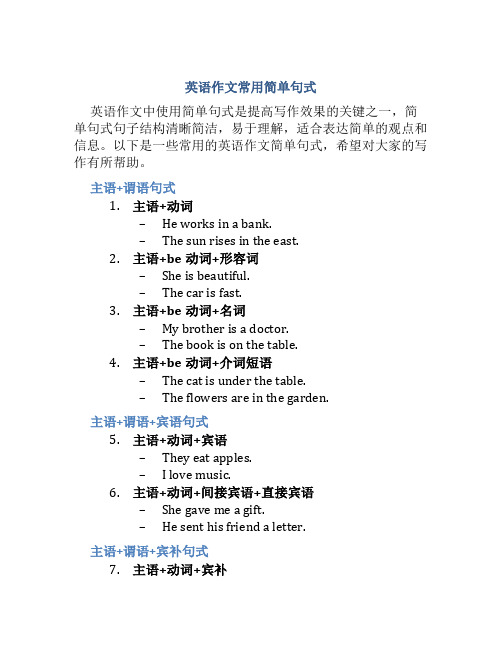
英语作文常用简单句式英语作文中使用简单句式是提高写作效果的关键之一,简单句式句子结构清晰简洁,易于理解,适合表达简单的观点和信息。
以下是一些常用的英语作文简单句式,希望对大家的写作有所帮助。
主语+谓语句式1.主语+动词–He works in a bank.–The sun rises in the east.2.主语+be动词+形容词–She is beautiful.–The car is fast.3.主语+be动词+名词–My brother is a doctor.–The book is on the table.4.主语+be动词+介词短语–The cat is under the table.–The flowers are in the garden.主语+谓语+宾语句式5.主语+动词+宾语–They eat apples.–I love music.6.主语+动词+间接宾语+直接宾语–She gave me a gift.–He sent his friend a letter.主语+谓语+宾补句式7.主语+动词+宾补–I find the book interesting.–She made him happy.主语+谓语+宾语+宾补句式8.主语+动词+宾语+宾补–He painted the wall red.–They elected him president.主语+系表结构9.主语+系动词+表语–She looks tired.–The milk smells sour.以上这些常用的英语作文简单句式可以帮助大家在写作过程中更加清晰地表达思想,提升写作的效果。
希望大家能够灵活运用这些句式,写出更加流畅、连贯的英语作文。
专题 英语写作中无灵主语的应用 -高考英语写作训练

Cooperative research
积极类情绪: 开心 happiness delight joy pleasure exultation 激动 thrill excitement 放松 relief relaxation 热情passion enthusiasm 满意 satisfaction contentment 惊讶surprise shock amazement astonishment 自豪pride 同情sympathy
Cooperative research
第一类:身心和情感状态的名词作名词 句型结构:feelings + take hold of/ seize/ get control of/ creep on/engulf Sb.
而表示情感的名词前可以加 a sense of A feeling of A burst of
to the powerful measures.
(4)经过艰苦的努力,他终于被北京大学录取,从此开 启了人生的新篇章。
After painstaking efforts, his admission to the Peking University starts a his new life.
Practice 翻译句子
Practice 翻译句子
(5)上周日,我不慎把书包遗失在操场上,里面有学生 证,手机,钱包等物品。 Last Sunday witnessed thel oss of my schoolbag on the playground, in which there were a Student ID, a mobilephone, and a wallet, etc. (6) 我们计划在艺术楼演讲大厅举办书法讲座。 The lecture hall of the Art Buildingwill witness the lecture on Chinese calligraphy.
英语知识运用及写作训练(含答案)

英语知识运用及写作训练第一部分:英语知识运用(共两节,满分45分)第一节:完形填空(共20小题;每小题1.5分,满分30分)阅读下面短文,从短文后各题所给的四个选项(A、B、C和D)中,选出可以填入空白处的最佳选项。
We were depressed and things were tough. Mom had a41time raising us on her own because Dad died five years ago. We relied on social assistance for42.Looking back, I43 remember what Mom went through to send us to school. I studied hard then. Every morning, she would put a new piece of cardboard in our shoes because our shoes were44. Constant moving was typical for my family in these times. Rent was 25 dollars a month but Mom couldn't45it. Though it was hard, we never46. Christmas was approaching. We were given 25 dollars for social services. Instead of buying food, Mom would use the money to pay the47 , ensuring us all of a48 over our head.49we had nothing for Christmas.Unknown to Mom, I had been selling Christmas trees to earn enough money for a new pair of50. On the afternoon of Christmas Eve, I was51to go to catch the bus.As I reached the stop, I began to feel52 . I was going to buy a new pair of boots53 Mom was at home in tears. My mind was54 and I realized what I had to do. I didn't get on the55.I went in a grocery store and bought the Christmas treats. I56home and put them quietly against the door. I knocked on the door. When Mom opened the door,57rolled into the house. She just stood there58. I managed to hold back the59, saying, “Merry Christmas, Mom! There really is a Santa Claus!”That day I got many60and kisses from Mom. It was a Merry Christmas for us after all!41.A.good B.short C.hard D.funny42.A.life B.travel C.nursery D.movement43.A.hardly B.still C.yet D.then44.A.handed over B.picked up C.turned over D.worn out45.A.store B.afford C.make D.getplained B.glanced C.envied D.calculated47.A.decoration B.gifts C.rent D.clothes48.A.cloud B.light C.roof D.window49.A.And B.But C.Or D.So50.A.glasses B.jeans C.boots D.socks51.A.lucky B.concerned C.fearful D.excited52.A.frightened B.guilty C.proud D.content53.A.while B.because C.whether D.unless54.A.woken up B.made up C.given away D.turned down55.A.platform B.train C.bus D.plane56.A.drove B.rang C.left D.rushed57.A.balls B.shoes C.dollars D.things58.A.surprised B.nervous C.disappointed D.painful59.A.words B.trouble C.tears D.sweat60.A.candies B.hugs C.awards D.creams第二节:语法填空(共10小题;每小题1.5分,满分15分)阅读下面材料,在空白处填入适当的内容(1个单词)或括号内单词的正确形式。
写作句子结构(基础篇)
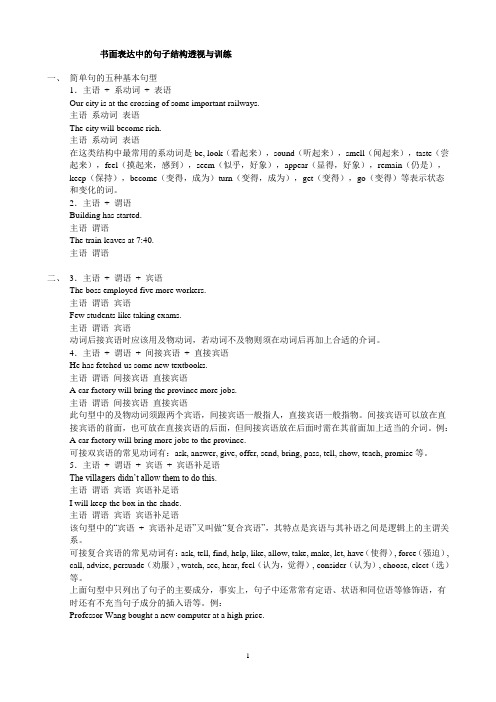
书面表达中的句子结构透视与训练一、简单句的五种基本句型1.主语+ 系动词+ 表语Our city is at the crossing of some important railways.主语系动词表语The city will become rich.主语系动词表语在这类结构中最常用的系动词是be, look(看起来),sound(听起来),smell(闻起来),taste(尝起来),feel(摸起来,感到),seem(似乎,好象),appear(显得,好象),remain(仍是),keep(保持),become(变得,成为)turn(变得,成为),get(变得),go(变得)等表示状态和变化的词。
2.主语+ 谓语Building has started.主语谓语The train leaves at 7:40.主语谓语二、3.主语+ 谓语+ 宾语The boss employed five more workers.主语谓语宾语Few students like taking exams.主语谓语宾语动词后接宾语时应该用及物动词,若动词不及物则须在动词后再加上合适的介词。
4.主语+ 谓语+ 间接宾语+ 直接宾语He has fetched us some new textbooks.主语谓语间接宾语直接宾语A car factory will bring the province more jobs.主语谓语间接宾语直接宾语此句型中的及物动词须跟两个宾语,间接宾语一般指人,直接宾语一般指物。
间接宾语可以放在直接宾语的前面,也可放在直接宾语的后面,但间接宾语放在后面时需在其前面加上适当的介词。
例:A car factory will bring more jobs to the province.可接双宾语的常见动词有:ask, answer, give, offer, send, bring, pass, tell, show, teach, promise等。
英语作文写作句型:17种基本句子

英语作文写作句型:17种基本句子1、通用句式:英语句式:(状语)+主语+(状语)+谓语+宾语+(地点状语)+(方式状语)+(时间状语)中文句式:主语+(时间状语)+(地点状语)/(方式状语)+谓语+宾语[误] I last Sunday with my father by plane went to Beijing. (中文句式)[正] I went to Beijing by plane with my father last Sunday.[正] Last Sunday, I and my father went to Beijing by plane.2、人称代词和物主代词[误] I have a pet. A pet is called Polly.[正] I have a pet. It is called Polly.[误] This is my new friend. You can call she Lily.[正] This is my new friend. You can call her Lily.[误] This is my bike. That is she's bike.[正] This is my bike. That is her bike.[误] Your shoes are older than my.[正] Your shoes are older than mine.3、There be 与have[误] The table have some flowers.[正] There are some flowers on the table.[误] There will have a film this evening.[正] There will be a film this evening.4、Be, do, does, did[误] He is live in Canada.[正] He lives in Canada.[误] Mr. Green is/does sometimes read newspaper. [正] Mr. Green sometimes reads newspaper.[误] I am not like dogs.[正] I don't like dogs.[误] Jenny wasn't call me last night.[正] Jenny didn't call me last night.[误] Our English teacher in the office.[正] Our English teacher is in the office.5、can, may, must, should, couldI can sing and dance.We should keep quiet in the reading room.6、will, shall, be going to[误] Jack will comes to China next week.[正] Jack will come to China next week.We shall go for a picnic next week.Mr. Green is going to buy a car next month.7、and, but, or, too, alsoMy favorite holidays are spring and fall.My father likes watching TV. I like watching TV, too.[误] October is not too cold and cold in Quanzhou.[正] October is not too cold or cold in Quanzhou.[误] I like English, and I don't like math.[正] I like English, but I don't like math.8、sometimes, often, always, usually, never, hardly, all the timeIn the morning, my father always plays sports.= In the morning, my father plays sports all the time.9、for example, such as,We will do some activities, such as going boating, climbing hills, playing games, having a picnic and so on.We should help the old. For example, we can clean the house, carry water and tell interesting stories.10、作比较I think football is as popular as basketball in America.English is not so/as easy as Chinese.I think math is more/less interesting than art.。
从五种基本句型开始提高英语写作能力附答案

写作步步高1.如何写好简单句只含有一个主谓结构的句子(有时含有并列主语或并列谓语动词)叫作简单句。
简单句的五种基本句型和There be句型介绍如下:1)主语+不及物动词(S+V)2)主语+及物动词+宾语(S+V+O)3)主语+系动词+表语(S+V+C)4)主语+及物动词+间接宾语+直接宾语(S+V+IO+DO)5)主语+及物动词+宾语+宾语补足语(S+V+O+C)6)There + be 句型基本句型1主谓结构由“主语+不及物动词”构成,常用来表示主语的动作。
主语可有修饰语(定语),谓语可有修饰语(状语)。
如:Great (定语)changes have taken place in my home town 状语)in the past ten years.(状语)She sat there alone, reading a novel.(形容词alone和分词短语作伴随状语)基本句型2主谓宾结构由“主语+及物动词+宾语”构成。
宾语成分的多样化使得这一结构异常复杂,不定式就经常充当宾语。
如:The Internet helps (to) make many friends.(不定式作宾语)The student union has decided to organize a music week.So I hope to teach foreigners Chinese and spread Chinese culture.基本句型3主系表结构由“主语+系动词+表语”组成,用以说明主语的特征,类属,状态,身份等。
系动词有:(1)表示特征和存在状态的be, seem, feel, appear, look, smell, taste, sound;(2)表示状态延续的remain, stay, keep, continue, stand(3)表示状态变化的become, get, turn, go, run, fall, come, grow Traffic in cities is getting heavier and heavier.Anyone should be honest and helpful to his families, teachers and classmates.As is in China, the weather is different from area to area.It is a fact that they can t pass the exam.The dish tastes delicious. (taste, feel, sound, smell等词作连系动词时,无被动语态)运用以上三种句型翻译下列句子1.我收到了笔友从澳大利亚寄来的信。
【2021小升初英语】写作训练2

写作一一、范文展示。
(一) 请根据以下信息介绍自己一天的活动。
要求:1. 语句正确、通顺。
2. 不得少于6句话。
(二) 请用几句话描述你最喜欢的和不喜欢的季节,并简要说明原因。
要求:1. 语句正确、通顺。
2. 可以展开适当的联想。
3. 不得少于40个单词。
(三) 请“This is me ”为题来介绍自己,重点介绍自己的周末活动、出生日期以及最喜欢的季节。
要求:1. 语句连贯,表达正确,书写工整。
2. 可以展开适当的联想3. 不少于40个单词。
birthday is in spring . It’s on March the third. This is me. Do you like me? 天。
它在3月3号。
这就是我,你喜欢我吗?(四) 请仔细观察图片,这是一个大家庭。
每个人都在做自己喜欢的事情。
他们都在做什么呢?请描述一下吧。
要求:1. 描述的人物行为要符合图片的内容,可以适当加入自己的想象。
2. 语句连贯,表达正确,书写工整。
3. 请以“My family”为题。
4. 不少于6句话。
范文:My familyLook, this is my family. My father and my mother are reading newspapers. My brother and my sister are playing games. What is my little brother doing? He is drawing a picture. I am watching TV now. We are all very happy. 译文:我的家庭看,这是我的家庭。
我的爸爸和妈妈正在看报纸。
我的哥哥和姐姐正在玩游戏。
我的小弟弟在干什么?他正在画画。
我现在正在看电视。
我们都很快乐。
二、写作训练。
(一) 一年中我们会度过很多个节日,请从下面选一个你最喜欢的节日,向大家介绍一下。
要求:1. 以“My favourite festival”为题。
高中英语真题-2014高考英语书面表达基础训练题(5)及答案
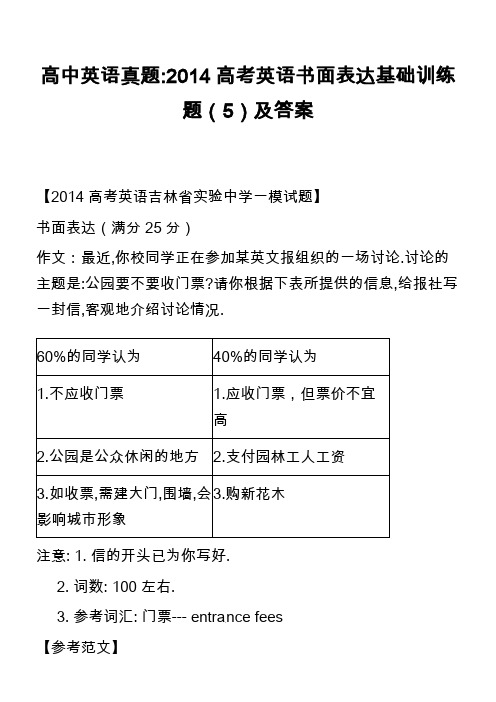
高中英语真题:2014高考英语书面表达基础训练题(5)及答案【2014高考英语吉林省实验中学一模试题】书面表达(满分 25分)作文:最近,你校同学正在参加某英文报组织的一场讨论.讨论的主题是:公园要不要收门票?请你根据下表所提供的信息,给报社写一封信,客观地介绍讨论情况.注意: 1. 信的开头已为你写好.2. 词数: 100 左右.3. 参考词汇: 门票--- entrance fees【参考范文】Dear editor,I'm writing to tell you about the discussion we've had about whe ther an entrance fee should be charged for parks.Opinions are divided on the question. 60% of the students are against the idea of entrance fees. They believe a public park sh ould be free of charge. People need a place where they can res t and enjoy themselves. Charging entrance fees will no doubt k eep some people away. What is more, it will become necessary to build gates and walls, which will do harm to the appearance of a city.On the other hand, 40% think that fees should be charged beca use you need money to pay gardeners and other workers, and t o buy plants and young trees. They suggest, however, fees sho uld be charged low.Yours trulyLi Hua【2013界广东省汕头市质量测评试题】基础写作(满分is分)和睦的家庭有利于孩子的个性发展和家人的身心健康。
6中考英语写作训练(二)

网络课程内部讲义(中|考)英语写作训练(二 )教师:李永梅保护环境 ,从我做起 ,提倡使用电子讲义Jinghua "在线名师〞→资料室免费资料任你下载(中|考)英语写作训练(二 )一、模拟试题 12021 年政府取消了 "五一〞黄金周 (My golden week ),但是 ,最|近有些人又提出要恢复7 天的长假 .同学们也在校园网的 "自由论坛〞上展开了剧烈的讨论 .请你选用下面表格所提供的信息 ,写一篇短文 ,谈谈恢复长假的利与弊 ,并简述你的观点 ,写出一至|两条理由 .注意:1.字数不少于60.2.所给的开头句不必抄在答题纸上 .Advantages Disadvantages1.have a good rest…2.spend more time…with……..1.cause a lot of trouble…2.be crowded everywhere………In 2021, ‘May golden week , was canceled, but this year people have discussed the problem whether we should renew "May golden week , or not.2根据中文大意和英文提示词语 ,写出意思连贯 ,符合逻辑 ,不少于60 词的短文 .所给英文提示词语供选用 .请不要写出你的校名和姓名 .暑假期间 ,一些外国朋友将到你校参观访问 ,学校准备进行一次英文征文活动 .征文内容:向外国朋友简要介绍你的学校生活以及一个或一件你最|难忘的人或事 ,并表达你对学校生活的感受 .提示词语:my school, busy, activities, after class, once ,help, encourage, give up3根据中文提示和英文内容 ,写出意思连贯、符合逻辑、不少于60 词的短文 .请不要写出你的校名和姓名 .最|近英文报纸刊登了关于读书情况调查的文章 .你喜欢读书 .请你阅读下面的文章节选局部 ,然后以 " The Importance of Reading〞为题投稿 ,简评文章的内容并结合自己的情况就读书问题发表自己的看法 .文章节选:In recent years, people seem to study more as communication and technology develop. However, there are still some problems, including fewer and fewer people reading books in their spare time. According to a study ,only 48.7 percent of junior high school students read in their spare time.Jinghua "在线名师〞→答疑室随时随地提问互动…No matter what happens, book reading is something we can ,t give up. Whether we can develop reading habits is closely connected to the development of our nation.4根据中文提示和英文内容 ,写出意思连贯、符合逻辑、不少于60 词的短文 .假设你是John ,今天你在网上看到了下面的帖子 .请根据帖子内容 ,谈谈你的经历或看法 ,并针对作者的困惑提出一些建议(不少于三条) .注意:不要写出真实校名和姓名 .5请你阅读你的加拿大网友Tommy 的e -mail ,根据e -mail 的内容 ,给他写一封回信 .注意:1.字数不少于60 .2.所给的开头句和结尾不必抄写在答题纸上 .Dear Li Lei,I haven't heard from you for a long time. I'm glad to tell you that I'll visit Beijing this summer vacation. It is said that Beijing is a great city with a long history and more changes have taken place since the 2021 Olympic Games. I would like to know something about Beijing, such as places of interest, the environment, traffic and people there.I'm looking forward to hearing from you soon.Yours,TommyDear Tommy,I'm glad to know you will come to Beijing.Yours,Li LeiJinghua "在线名师〞→资料室免费资料任你下载6根据中文提示和英文书信内容 ,写一封意思连贯、符合逻辑、不少于60 词的回信 ,信的开头和结尾已给出 ,其字数不计入所完成的回信内 .假设你叫李阳 ,是英国中学生Mike 的朋友 ,你收到了他的一封电子邮件 .请根据他来信的内容写一封回信 .针对他的困惑 ,谈谈你的看法 ,同时提出一些建议 .Dear Li Yang,How are you?I had a very good time with you and your family in Beijing last month. It impressed (留下深刻印象 ) me a lot that many students went to school by bike. I like cycling, and have a bike which my uncle bought me for my birthday. I want to ride to school too, but my parents don't agree. I'm 15 years old now, but they keep driving me to school and picking me up every day. These days, I am always angry with them because they just allow me to ride in the park on weekends. Last night I went out to ride my bike after they fell asleep. It was so cool!I'm thinking of riding to school in the morning before they get up. Do you think it's a good idea or not?Yours,Mike7根据中文提示和英文内容 ,写出意思连贯、符合逻辑、不少于60 词的短文 .请你阅读下面有关奥运冠|军费尔普斯的文章节选局部 ,然后以中学生李华的名义给费尔普斯写一封信 ,简述他的行为和你的看法 ,然后给他提出有效缓解压力的建议 .文章节选:Phelps Apologizes to FansOlympic champion Michael Phelps has apologized ( 道歉 )to Chinese fans the Internet for taking marijuana ,a kind of drug."As many of you know ,I recently did something that was not what people expect from me.〞 Phelps said. with his words printed in Chinese."The past few days have been hard for me ,but I ,ve received support and encouragement online from so many Chinese friends.〞Dear Phelps,I am Li Hua, a middle school student from Beijing.8根据中文提示和英文内容 ,写出意思连贯、符合逻辑、不少于60 词的短文 .假设你是一所国际学校校办英文杂志的学生编辑 .你看了下面这封信后 ,想写一篇关于该信的读后感 ,内容要点包括:你对此事件的看法;解释你的理由并提出你的建议;向受害者表达尽快康复的祝愿 .(注意:1.不能出现真实姓名和学校名称 .2.可以参照阅读材料的内容 ,但不得直接引用原文中的句子 )Jinghua "在线名师〞→答疑室随时随地提问互动Dear editor,I ,m writing to tell you about food safety. Several days ago ,my neighbor family ate something bad from the market. After the meal, they had stomachaches and brought up what they had eaten. Fortunately, another neighbor passed by and saw the accident and immediately called the ambulance (救护车 ). It carried them quickly to hospital. After several hours, they were saved.From this all of us have realized the importance of food safety. And I do hope the whole society shall begin doing something to protect people ,s life safety.Yours,Li HuaAIn 2021, ‘May golden week , was canceled, but this year people have discussed the problem whether we should renew "May golden week , or not.Some people think the 7 -day holiday is very important. Firstly, we could have a good rest and refresh ourselves after several months of hard work. Secondly, we could spend more time staying with our family. Thirdly, we will be able to use the one -week vacation to travel to some farther places such as foreign countries.However, other people hold the opposite view. They think it causes a lot of problems. It may lead to traffic jam and visitors will not enjoy themselves if the traveling sports are over -crowded.As a student, I prefer a 7 -day holiday. Not only can I sleep well and do exercise, but also I can read some interesting books. How I wish a 7 -Day holiday would come soon!BMy school is not very big, but I love it very much. My busy school life always makes me happy. I not only have all kinds of classes, but also take part in colorful activities after classes, such as competition, ball games. In my school, I ,ve got encouragement from my teacher as well as knowledge. Once I failed my exam, my teacher told me not to give up easily when difficult work lies before you. I was so moved that I made up my mind to catch up with my classmates. Now my study has greatly improved. I thank my teacher for her help.I ,m leaving my school. I ,ll never forget the days I ,ve spent there.CThe Importance of ReadingI am surprised to know so few students read in their spare time. Students should be able to find some time to read books because book reading is very important. I enjoy reading stories as well as newspapers and magazines. I usually spend about half an hour in the evening and two or three hours on weekends reading. Inmy opinion, reading is not only interesting but also helps improve your skills of collecting information. The more you read, the more you will like it. By reading you may become wiser.Jinghua "在线名师〞→资料室免费资料任你下载DDear Madam ,I'm sorry to know that you have SO much trouble with your daughter ,and I don ,t think she should always play computer games .But don ,t worry .You can ask her teacher for help Or you can invite some of her friends to have a word with her . You ,d better encourage her to find out that spending too much time 011 -computer games is bad for her health and studies.Try to encourage her to do other things instead of playing computer games.What ,s more ,as her mother, you should learn something about computer games so that you and your daughter may have something to talk about.Besides ,you may find some topics that your daughter is interested in ,and then she may talk with you.Don't lose heart.It win be all r ight.JohnEDear Tommy,I , m glad to know you will come to Beijing. Beijing, the capital of China, is one of the largest cities in the world. There are many places of interest, such as the Summer Palace, the Forbidden Cityand the Great Wall. All of them are beautiful and well -known to the world. Great changes have taken place in Beijing since we successfully held the 2021 Olympic Games.People pay more attention to the environment. More trees and flowers have been planted. For the traffic, it is very convenient for people to travel around Beijing because several new subway lines have been built. If you come to Beijing, you will find people here are very friendly and helpful. What ,s more,a lot of people can speak English. Beijing is really an attractive city with a long history.I , m looking forward to hearing from you soon.Yours,Li LeiFDear Mike ,Nice to hear from you. I understand how you feel because I like cycling too , but I don ,t think it is good that you ride to school in secret ,not telling your parents. In fact ,your parents really care aboutyou a lot. You should talk about it with your parents. After all , you are old enough to go to school by yourself. If your school is not far , why not ask your parents to ride with you to school for a few daysso that they won ,t be so worried. I ,m sure that you will find a way out.Good Luck !Dear Phelps ,Yours ,LiYang GI am Li Hua ,a middle school student from Beijing. I couldn ,t believe that you took marijuana. It was really a had thing to do. But I am glad you have realized taking drugs is wrong. I hope you don ,t take drugs again. You should learn to live a healthy life. These are many things you can do in your spare time. For example , y ou can go and have a picnic with your friends. If you like music ,you can go to concert. ChattingJinghua "在线名师〞→答疑室随时随地提问互动on the Internet is also a good idea. Why don ,t you have a try? Best wishes ,Li HuaHOne possible version:Today , I received the reader , s letter. I was shocked at it. Personally speaking , I think we should pay more attention to the food safety. The government must make some necessary laws. What ,s more , some businessmen shouldn ,t be only interested in making money. They must care about people ,s health. We ,d better not eat anything in dirty places though some food is delicious ,because eating unhealthy food does harm to our health.Finally , I hope the family in the accident will get better soon.二、文段分析1Every family has lots of housework. Everyone should learn to do some of it. I often help my parents do housework such as washing clothes, cleaning the room and watering flowers.I think I ,ve learned how to take good care of myself and my family by doing housework. Sometimes cleaning all the windows is an enjoyable experience. I really feel proud of myself. And doing housework is also a kind of exercise.The summer holiday is coming. I ,m going to learn how to cook some dishes. My parents will be happy to enjoy them.2Lin Hao is a student. He is only nine years old. After Wenchuan Earthquake happened, he saved two of his classmates. Then he walked for seven hours to safety.I was deeply moved by his story. I think he is a brave boy. He did his best when he faced great danger. I should learn from him. I will think of others first and help them as much as possible. I will never give up when I face any difficulties.3Mum gives me the greatest help. She is quite different from other mothers. She tries to find mistakes in everything I do and leaves more and more work to me.As I grow up, I have become better and better at my lessons and learned to do more and more housework. I ,m sure I can take care of everything I will meet.Now I really understand mum ,s love. I think it ,s important for everyone to stand on his own feet.4Hi TomI ,m Li Hua from Class2, Grade 3. I was born in Beijing. I know Beijing very well. So I think I can give you some good suggestions. Why not buy a map of Beijing or a guide book? Or try to find information on the internet. Also, you can watch TV programs and read China Daily. Would you like to go around Beijing with me on weekends? I ,m g lad to be your tour guide. Come to my class if you need my help.Li HuaJinghua "在线名师〞→资料室免费资料任你下载5Hi Lucy,Nice to hear from you. Everyone has his favorite stars and there ,s nothing wrong with that. I understand you.But I don ,t think what you do is right since you are a student. You ,d better read more interesting books and have more sports in your free time. Stop writing to him and watching his films. You may also tell your problem to your parents and teachers. I ,m sure they ,ll help you. Running away to Hollywood is a wrong idea. Work hard on your lessons and get ready for the exams. Your future is in your hands.Yours,Li Ling6My MotherMy mother is very kind and easygoing. She helps me a lot. She takes good care of my daily life. For example, every morning, she wakes me up and cooks breakfast for me. When I ,m in trouble, she always encourages me to face my difficulties and cheers me up. I still remember that once I argued with my best friend and was upset. My mother talked with me the whole night and finally helped me solve the problem. With her help, I became a top student in my class. I ,m very thankful for all that she has done for me. I believe she will be proud of me in the near future.My TeacherMy English teacher Ms. Lee is very kind and easygoing. She helps me a lot. She takes good care of us.She often helps me with my English. When I ,m in trouble, she always encourages me to face my difficultiesand gives me good advice. I still remember that once I failed in an important English exam and was upset. She cheered me up and told me some good ways to improve my English. With her help, I made great progress in English and became increasingly interested in it. I ,m very thankful for all that she has done for me. I ,ll try my best to live up to her expectations.7Dear David,I ,m goad you ,ll come to Beijing to learn Chinese. _Chinese is very useful, and worry foreigners one learning now. It ,s difficult for you because it ,s quite different from English. You have to remember usworry Chinese wands as possible. It ,s also important to do some reading and writing. You can watch TV and listen to the radio to practise your listening. Do your best to talk with people in Chinese. You can learnChinese not only from books but also from people around you. If you have any question, Please ask me, I ,msure you ,ll learn Chinese well.Hope to see you soon in Beijing.Yours,Wang MingJinghua "在线名师〞→答疑室随时随地提问互动8We ,ve got many calls from our schoolmates. They have different problems.A girl named Mary said there were many rules in her family. For example, she had to do a lot of housework ( chores)after school. Another girl called Lucy felt worried because the pet dogs in her neighborhood made the ground dirty.Here I have some suggestions for Mary. From your call, I know you have different ideas about yourfamily rules. If I were you, I would have an honest talk with my parents because we can exchange opinionsand then understand each other better. Or why not consider writing a letter? Maybe that ,s a good solution. I guess you must be a lovely girl and they just want you to be successful. I believe they may feel proud of you. Good luck!9I am a middle school student. I learn many subjects at school. After class, my classmates and I oftentake part in different school activities. I ,m interested in computer science and I often go to our school computer group. I learn to get useful things from the Internet. I think it is important to learn to use computers because they are used everywhere in our modern life. I want to work for our country with computers when I grow up.10Beijing is the capital of China with a long history.There are lots of places of interest, such as the Great Wall, the Palace Museum, and the Summer Palace and so on. Since it lies in the north of China, the winter here is long and it snows sometimes. Autumn is the best season in Beijing, for it is neither too cold nor too hot. One of the most famous traditional foods is Beijing (Roast)Duck. The 2021 Olympic Games will be held in Beijing. By hosting the Olympics, we ,ll have the chance to let the world know more about China and Beijing. So, come to Beijing and you'll enjoy it.(l10w)。
高考英语基础写作题专题训练(有范文)

语鹅市安置阳光实验学校广东高考英语基础写作专题训练1.写信介绍北京假设你是李华,你的网友Peter 来信,他想北京奥运会期间来北京旅游,你回信给他,介绍北京。
内容要点如下:[写作要求]只能使用5个句子表达全部的内容,开头和结尾已经写好,不计入总句数。
[评分]句子结构的准确性,信息内容的完整性和连贯性。
参考词汇:国家体育馆 National Stadium 国家游泳馆 National Swimming Stadium Dear Peter,Welcome to Beijing.I am looking forward to the day you come to Beijing. See you then. Yours truly, Li Hua2.介绍2008奥运火炬传递假设你是李华,学校广播站的英文编辑。
你请根据一下信息,写一篇英语短文,要向学校师生介绍一下北京奥运的火炬传递情况。
[写作要求]只能使用5个句子表达全部的内容,开头和结尾已经为你写好,不计入总句数。
[评分]句子结构的准确性,信息内容的完整性和连贯性。
参考词汇:希腊古奥林匹亚遗址ancient Olympia, Greece 火炬 torch3. 通知假设有一批澳大利亚学生到广东香城游学,你是项目的负责人,在出发前你简要向学生们介绍这次安排。
请写一个简要的发言稿,主要内容如下:[写作要求]只能使用5个句子表达全部的内容,开头和结尾已经为你写好,不计入总句数。
[评分]句子结构的准确性,信息内容的完整性和连贯性。
Attention please, everyone:Now I would like to tell you the arrangement for the journey.…That’s all. Thank you.4. 郊游日记请根据以下内容提示,写一篇英文日记(题头已写好)。
[写作要求]只能使用5个句子表达全部的内容。
外研社七上英语写作训练及范文

外研社七上英语写作训练及范文M1(介绍个人/朋友)●作文练笔:假设你是一个英国女孩,现在在中国。
下面是你的身份卡,请你根据表中内容写一篇介绍自己的英文短文。
作文要求:语句连贯,词数60左右。
-------------------------------------------------------------------------------------------------------------------●参考范文:Hello! My name’s Linda Cooper. I’m from England. Linda is my firstname and Cooper is my last name . I’m 13 years old. I’m in Class 4 Grade 7. This is my friend Lucy. She is from America and she is in my class. She is 13 years old too. She is very friendly and I am lively. We are very good friends.M2(介绍家庭成员)●作文练笔:假设你是Ann,请你给你的朋友Mike写一封电子邮件,介绍你的家庭成员。
内容包括:1.我家里共有6口人,祖父母,父母,我和弟弟。
2.爸爸是一家工厂的工人,妈妈是数学老师。
3.弟弟只有4岁,还没有上学,我今年12岁,是一所中学的学生。
作文要求:1.语句连贯,词数60左右。
2.邮件开头和结尾已经给出,不计入总词数。
-------------------------------------------------------------------------------------------------------------------参考范文:Dear Mike,There are 6 people in my family. They are my grandparents, my parents, my younger brother and I. My father is a factory worker and he is very hardworking. My mother’s job is at a school. She is a math teacher. And she is very nice. My brother is only 4 years old and my grandparents look after him. I’m 12. I am a student of a middle school. I have a big and happy family.Best wishes!Yours,AnnM3(介绍校园)●作文练笔:请你根据下图内容写一篇英语短文,介绍一下你的新学校。
英语作文句子训练模式
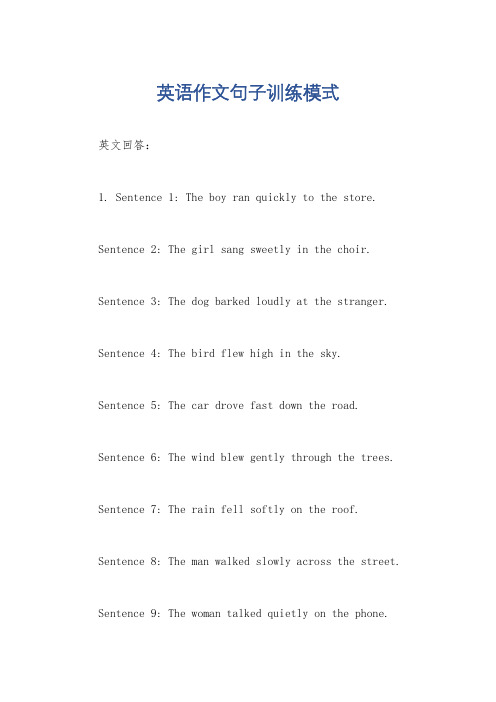
英语作文句子训练模式
英文回答:
1. Sentence 1: The boy ran quickly to the store.
Sentence 2: The girl sang sweetly in the choir.
Sentence 3: The dog barked loudly at the stranger. Sentence 4: The bird flew high in the sky.
Sentence 5: The car drove fast down the road.
Sentence 6: The wind blew gently through the trees. Sentence 7: The rain fell softly on the roof.
Sentence 8: The man walked slowly across the street. Sentence 9: The woman talked quietly on the phone.
Sentence 10: The child laughed happily in the playground.
中文回答:
句子 1,男孩迅速跑到商店。
句子 2,女孩在合唱团里甜美地歌唱。
句子 3,狗对陌生人大叫。
句子 4,鸟在天空高高飞翔。
句子 5,汽车在公路上疾驰而过。
句子 6,风轻轻地吹过树叶。
句子 7,雨轻轻地落在屋顶上。
句子 8,男人缓慢地穿过街道。
句子 9,女人在电话里轻声说话。
句子 10,孩子在操场开心地笑。
(新)外研版六年级英语上册专项练习—写作

专项训练四:写作一、范文展示1. 小朋友,你都有哪些兴趣爱好呢?请以“My hobby”为题,写一写你的兴趣爱好吧!不少于6句话。
范文My hobbyI have lots of hobb ies. But I like playing basketball best. It's very inte resting. I often play basketball with my friends on weekends. I also play basketball with my classmates at school. I am a member of our school basketball team. I have got two basketballs. My father bought them for me. I play basketball every day. Playing basketball is good for our health. Do you like playing basketball?译文我的业余爱好我有许多业余爱好。
但我最喜欢打篮球了。
打篮球非常有趣。
我经常在周末和朋友一起打篮球。
在学校里我还和同班同学一起打篮球。
我是我们学校篮球队的一名成员。
我有两个篮球。
那是爸爸给我买的。
我每天都打篮球。
打篮球有益于我们的健康。
你喜欢打篮球吗?2. 你一定很熟悉我们中国的传统节日中秋节吧!请你用英语介绍一下它。
不少于6句话。
范文The Mid-Autumn Festival is one of the most important traditional festivals in China. Families get together and have a big dinner at the Mid-Autumn Festival. The most popular food is moon cakes. They are round. They loo k like the moon. People eat delicious food and enjoy the beautiful moon. People often talk about the story of Chang'e and her rabbit. I like this festival very much.译文中秋节是中国最重要的传统节日之一。
(完整版)英语五种基本句型及练习
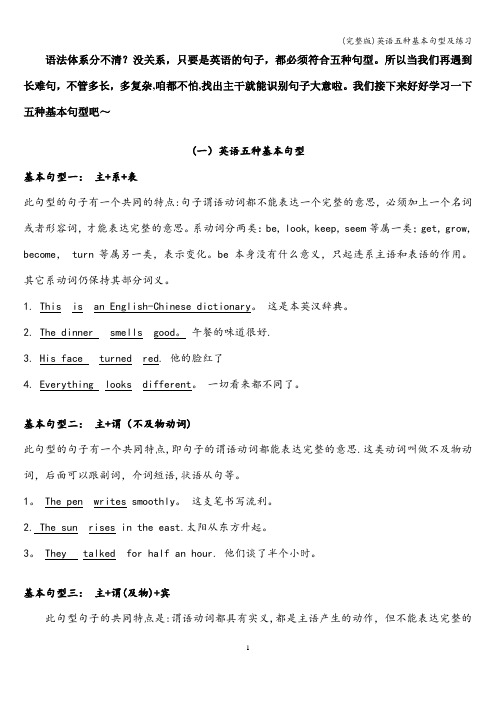
语法体系分不清?没关系,只要是英语的句子,都必须符合五种句型。
所以当我们再遇到长难句,不管多长,多复杂,咱都不怕,找出主干就能识别句子大意啦。
我们接下来好好学习一下五种基本句型吧~(一)英语五种基本句型基本句型一:主+系+表此句型的句子有一个共同的特点:句子谓语动词都不能表达一个完整的意思,必须加上一个名词或者形容词,才能表达完整的意思。
系动词分两类:be, look, keep, seem等属一类;get, grow, become, turn等属另一类,表示变化。
be 本身没有什么意义,只起连系主语和表语的作用。
其它系动词仍保持其部分词义。
1. This is an English-Chinese dictionary。
这是本英汉辞典。
2. The dinner smells good。
午餐的味道很好.3. His face turned red. 他的脸红了4. Everything looks different。
一切看来都不同了。
基本句型二:主+谓(不及物动词)此句型的句子有一个共同特点,即句子的谓语动词都能表达完整的意思.这类动词叫做不及物动词,后面可以跟副词,介词短语,状语从句等。
1。
The pen writes smoothly。
这支笔书写流利。
2. The sun rises in the east.太阳从东方升起。
3。
They talked for half an hour. 他们谈了半个小时。
基本句型三:主+谓(及物)+宾此句型句子的共同特点是:谓语动词都具有实义,都是主语产生的动作,但不能表达完整的意思,必须跟有一个宾语,即动作的承受者,才能使意思完整。
这类动词叫做及物动词。
1。
Who knows the answer?谁知道答案?2. He enjoys reading。
他喜欢看书.3。
My sister is writing a letter at this moment。
英语作文写作基本句型大全

英语作文写作基本句型大全Sure, here's a comprehensive list of basic sentence patterns commonly used in English writing:1. Subject + Verb: She runs.2. Subject + Verb + Object: They eat apples.3. Subject + Verb + Adverb: He speaks fluently.4. Subject + Verb + Adjective: The flowers smell sweet.5. Subject + Verb + Noun + Noun: The teacher gave the students a task.6. Subject + Linking Verb + Predicate Adjective: She is happy.7. Subject + Linking Verb + Predicate Noun: He is a doctor.8. Subject + Verb + Object + Object: She gave him a book.9. Subject + Verb + Adverb + Verb: He speaks English quickly.10. Subject + Verb + Adjective + Noun: They are intelligent students.11. Subject + Verb + Noun + Adjective: The cat is a playful pet.12. Subject + Verb + Noun + Adjective + Noun: The restaurant serves delicious Italian food.13. Subject + Verb + Adjective + Preposition + Noun: She is afraid of spiders.14. Subject + Verb + Adjective + Infinitive: He is happy to help.15. Subject + Verb + Adjective + Clause: She is happy that she passed the exam.16. Subject + Verb + Adjective + Prepositional Phrase: The house is big for a family of three.17. Subject + Verb + Adverb + Prepositional Phrase: He runs quickly to the store.18. Subject + Verb + Noun + Relative Clause: The man who lives next door is a doctor.19. Subject + Verb + Object + Infinitive: She wants to learn French.20. Subject + Verb + Object + Adjective + Infinitive: They find it difficult to understand.These sentence patterns should provide a good foundation for your English writing. Feel free to incorporate them into your compositions to add variety and clarity.。
英语b级作文万能句子
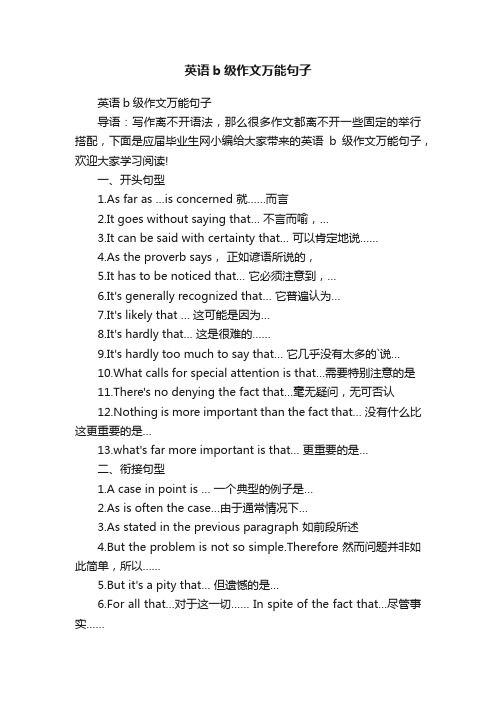
英语b级作文万能句子英语b级作文万能句子导语:写作离不开语法,那么很多作文都离不开一些固定的举行搭配,下面是应届毕业生网小编给大家带来的英语b级作文万能句子,欢迎大家学习阅读!一、开头句型1.As far as …is concerned 就……而言2.It goes without saying that… 不言而喻,…3.It can be said with certainty that… 可以肯定地说……4.As the proverb says,正如谚语所说的,5.It has to be noticed that… 它必须注意到,…6.It's generally recognized that… 它普遍认为…7.It's likely that … 这可能是因为…8.It's hardly that… 这是很难的……9.It's hardly too much to say that… 它几乎没有太多的`说…10.What calls for special attention is that…需要特别注意的是11.There's no denying the fact that…毫无疑问,无可否认12.Nothing is more important than the fact that… 没有什么比这更重要的是…13.what's far more important is that… 更重要的是…二、衔接句型1.A case in point is … 一个典型的例子是…2.As is often the case…由于通常情况下…3.As stated in the previous paragraph 如前段所述4.But the problem is not so simple.Therefore 然而问题并非如此简单,所以……5.But it's a pity that… 但遗憾的是…6.For all that…对于这一切…… In spite of the fact that…尽管事实……7.Further, we hold opinion that… 此外,我们坚持认为,…8.However , the difficulty lies in…然而,困难在于…9.Similarly, we should pay attention to… 同样,我们要注意…10.not(that)…but(that)…不是,而是11.In view of the present station.鉴于目前形势12.As has been mentioned above…正如上面所提到的…13.In this respect, we may as well (say) 从这个角度上我们可以说14.However, we have to look at the other side of the coin, that is… 然而我们还得看到事物的另一方面,即…三、结尾句型1.I will conclude by saying… 最后我要说…2.Therefore, we have the reason to believe that…因此,我们有理由相信…3.All things considered,总而言之It may be safely said that…它可以有把握地说……4.Therefore, in my opinion, it's more advisable…因此,在我看来,更可取的是…5.From what has been discussed above, we may safely draw the conclusion that…通过以上讨论,我们可以得出结论…6.The data/statistics/figures lead us to the conclusion that…通过数据我们得到的结论是,…7.It can be c oncluded from the discussion that…从中我们可以得出这样的结论8.From my point of view, it would be better if…在我看来……也许更好四、举例句型1.Let's take…to illustrate this.2.let's take the above chart as an example to illustrate this.3.Here is one more example.4.Take … for example.5.The same is true of…6.This offers a typical instance of…7.We may quote a common example of…8.Just think of…五、常用于引言段的句型1.Some people think that … 有些人认为…To be frank, I can not agree with their opinion for the reasons below.坦率地说,我不能同意他们的意见,理由如下。
小升初英文写作专题训练题100题含参考范文001

小升初英文写作专题训练题100题(含参考范文)学校:姓名:班级:考号:一、命题作文1.写一写。
我们每个人都有自己的卧室。
你的卧室是什么样子的?你会在卧室里做什么?请你写一写吧。
提示词:bed;desk;small;nice要求:1.请以“MyBedroom”为题H。
2.语句要正确、通顺。
3.不少于7句话。
【答案】范文:MyBedroomThisismybedroom.Ifssmallbutnice.Thereisabed,adesk,atableandachairinit. Mybooksandpencil-boxareonthedesk.Ialwaysdomyhomeworkthere.Myfootballis underthechair.Theclockisonthetable.Thereisapictureonthewall.Ifsnice.Ilikemy bedroom.【解析】【分析】【详解】1.题干解读:该题目要求用第一人称写出自己的卧室。
然后描述卧室的样子,有什么物品,然后写一写在卧室里做的事情。
注意文章为一般现在时态并要符合句子数量要求。
2.参考词汇与句型:参考单词:bed床;desk桌子;chair椅子;table桌子;small小的;nice漂亮的,do homework写作业,readbooks看书参考句型:Thisismy...;Thereisa...;Ialways…;...are/isonthedesk/underthechair/onthetable;【点睛】2.一年中的十二个月份你最喜欢哪个月份呢?请你以“Myfavouritemonth”为题,写一写你最喜欢的一个月份。
注意写清楚你最喜欢这个月份的理由。
要求:语句通顺,不少于5句话。
【答案】范文:MyfavouritemonthMyfavouritemonthisJune,becauseChildren'sDayisonthefirstdayofJune.My birthdayisalsoinJune.Andtheweatherisveryhot.Wecanputonbeautifulclothes.Icanfly akitewithmyfriendsandhaveapicnicwithmyfamily.Itisalwaysawonderfulmonth!SoI likeJunebest.【解析】【分析】【详解】1.题干解读:以“Myfavouritemonth”为题,写一写你最喜欢的一个月份。
必修三Unit2英语写作专项训练句子仿写
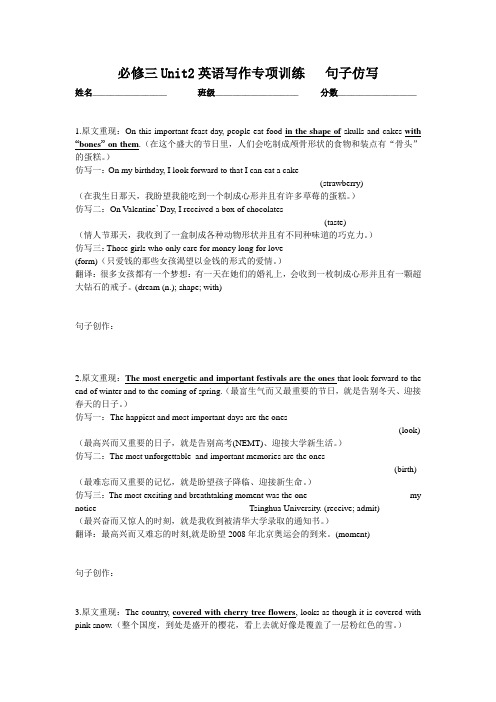
必修三Unit2英语写作专项训练句子仿写姓名_________________ 班级___________________ 分数__________________1.原文重现:On this important feast day, people eat food in the shape of skulls and cakes with “bones” on them.(在这个盛大的节日里,人们会吃制成颅骨形状的食物和装点有“骨头”的蛋糕。
)仿写一:On my birthday, I look forward to that I can eat a cake____________________________ ________________________________________________________(strawberry)(在我生日那天,我盼望我能吃到一个制成心形并且有许多草莓的蛋糕。
)仿写二:On Valentine’ Day, I received a box of chocolates _______________________________ _________________________________________________________(taste)(情人节那天,我收到了一盒制成各种动物形状并且有不同种味道的巧克力。
)仿写三:Those girls who only care for money long for love _______________________________ (form)(只爱钱的那些女孩渴望以金钱的形式的爱情。
)翻译:很多女孩都有一个梦想:有一天在她们的婚礼上,会收到一枚制成心形并且有一颗超大钻石的戒子。
(dream (n.); shape; with) _____________________________________________ _______________________________________________________________________________ _______________________________________________________________________________ 句子创作:______________________________________________________________________ _______________________________________________________________________________2.原文重现:The most energetic and important festivals are the ones that look forward to the end of winter and to the coming of spring.(最富生气而又最重要的节日,就是告别冬天、迎接春天的日子。
高考英语写作句子基础训练

高考常常利用句型1.It is+ n /adj.( necessary/ important/essential )that + sb. (should) + do sth.It is important that we (should) keep the public places clean.It is + n / adj for sb. to do sth.It is a must that everybody should know how to use computers.It is convenient for us to be able to use computersIt is +no/little use, no/much good, useless+doing sth.It’s no use crying over spilt milk.翻译:1.对一个高中生来讲,在一周内完成这个任务是很有挑战性的。
_________________________________________________________2.很遗憾你错过了这么出色的演出__________________________________________________________3.你们真是太好了,我像在家里一样。
____________________________________________________________4.跟他讲没用,因为他从来不听______________________________________________________________2.sb. finds / thinks /feels + it + n./ adj.+ (for sb. ) to do sth.We think it our duty to work hard.She finds it necessary to take down notes while listening.They feel it important to have some working experience.翻译:1.他感到很难跟你交谈。
- 1、下载文档前请自行甄别文档内容的完整性,平台不提供额外的编辑、内容补充、找答案等附加服务。
- 2、"仅部分预览"的文档,不可在线预览部分如存在完整性等问题,可反馈申请退款(可完整预览的文档不适用该条件!)。
- 3、如文档侵犯您的权益,请联系客服反馈,我们会尽快为您处理(人工客服工作时间:9:00-18:30)。
英语写作技巧与实践(1) (句子篇)●1、主语+动词(S V)●2、主语+动词+宾语(S V O)●3、主语+动词+补语(S V C)●4、主语+动词+状语(S V A)●5、主语+动词+宾语+状语(S V O A)●6、主语+动词+宾语+补语(S V O C)●7、主语+动词+间接宾语+直接宾语(S V Oi Od)●从以上基本句型看,英语的句子是围绕主语和动词进行的,因此在句子写作是主语和动词是永远的中心和首选,其它成分根据内容要求适当填补。
课堂练习(汉译英)●1、学生们在学习。
●The students are diligently studying.●2、人群欢呼起来。
●The crowd cheered.●3、随身听不好使了。
●The walkman doesn't work.●4、隔墙有耳。
●The wall has ears.●5、我给自己伤着了。
●I hurt myself●6、志强写了一篇漂亮的作文。
●Zhiqiang wrote a beautiful article.●7、他是我的好朋友之一。
●He is one of the best friends of mine.●8、李勇被选为学生会主席。
●Li Yong was elected chairman of the Students’ Union.●9、中国是个伟大的国家。
●China is a great country.●10、他住在美国。
●He lives in the United States.●16、天冷了,树叶黄了。
●It is cold, and leaves are turning yellow.●17、父母认为他们的孩子是个天才。
●The parents thought the child a genius.●18、许多外商把中国看成是个巨大的市场。
●Many foreign businessmen regard China as a huge market.●19、他的夫人给他买了一份漂亮的领带。
●His wife bought him a beautiful tie.●20、教授给我们看了他的影集。
●The professor showed us his photo album.英语句子通过连词(状语从句)、关系词(定语从句)和分词、动名词及不定式来构成句子,因此它的句子构成方式是“形合”的。
汉语句子则不同,它的句子往往是平行的,是通过意思和在一起的,因而是“意合”的。
●例如,汉语一个句子里可集结几个动词,“人们认为去看电影会花很多钱。
”,而英语一个句子只允许有一个主要动词,其他表示动作的次只能以非谓语形式或从句形式出现。
这是因为汉语中一个字不作任何变化,可以充当动词、名词、形容词或其他词性,而英语中一个词用作不同的词性有词形的变化。
●根据句子语法结构,英语可分为简单句,并列句,复合句。
简单句简单句可以独立存在,所以也称独立句。
简单句有一个主语(或并列主语)和一个谓语(或并列谓语)。
a. I don’t know her very well.b. He criticized and punished me: not two or three times in the week, nor once or twice in the day, but continually.c. They entered the room, singing and dancing.●并列句●并列句由两个或两个以上简单句子组成。
通过使用标点符号,并列连词,连接副词等语言手段,将简单句子连接成并列句子。
●1)并列连词:and, but, or, for, yet, so , nor●2)besides, furthermore, moreover, in addition, also(表示附加)●likewise, in the same way, similarly(表示类似)●however, nevertheless, still, nonetheless, otherwise, in contrast, on the other hand(表示对照和转折)●accordingly, consequently, hence, therefore, as a result, for this reason(表示因果关系)●thus, thereby, by this means, in this manner(表示手段与结果)●for example, for instance, in fact, in particular, indeed(表示加强语气或举例)●meanwhile, then, subsequently, afterwards, earlier, later(表示时间顺序)●并列连词同逗号一起使用;连接副词连接的并列句,通常在第一个分句后面有分号,连接副词如果位于第二个分句句首,其后用逗号;如果在第二个分句中间,则在其两端用逗号同句子分开。
连接副词如果同并列连词一起使用,就不用分号,而用逗号。
● A. The book is very good, but it is too expensive for me.● B. Some students are cleaning the window, and some others aresweeping the floor.● C.I t was late, thus you must go.(15)句子种类练习1、没有我的帮助他们完成不了工作,所以他们找到了我。
They can’t finish their work without my help, so they came for my help.●2、我非常喜欢这部电影,但我的哥哥却很讨厌它。
I am fond of this movie, but my brother doesn't’t like it.●3、此外,刘强还学了如何操作电脑。
In addition, Liu Qiang learned how to operate a computer.●4、他很聪明,可另一方面,他却出错很多。
He is very intelligent, on the other hand, he made many mistakes.●5、他跌倒了,腿骨折了。
结果是,他两个月将不能上课。
He fell down and hurt his leg. As a result, he was unable to go to class for two months.●6、李娜昨晚参加晚会了,因此没有做功课。
Li Na went to the party yesterday evening, so she didn't’t do her assignments.●7、妈妈去商店了,同时,我在家里准备晚餐。
Mother went shopping, meanwhile I was cooking dinner at home.●8、她好像不想去参加派对。
另外,她的衣着也不够好。
She didn't’t seemed to go to the party, beside, her clothes were not good enough.●9、你们班一些同学英语很好,比如,王刚英语说得很棒。
Some students from your class are good at English, for instance, Wang Gang is a very good speaker.●10、他一点不介意。
实际上,他很高兴。
He didn't’t mind. As a matter of fact, he was very pleased.●复合句●复合句由一个主句和一个或几个从句组成。
从句是在句子中充当一个句子成分的主谓结构,在句子中居次要地位,不能作为句子单独存在。
根据从句在句子中的作用,从句可分为名词性从句、形容词从句、副词从句。
这些从句必须由从属连词、关系代词、关系副词引导,依赖主句而存在,不能单独成为句子。
名词性从句●1)动词主语的名词从句●That money doesn’t grow on trees should be obvious.●It is obvious that money doesn’t grow on trees.●2)作动词宾语的名词从句●Everybody knows that money doesn’t grow on trees●3)描写感情的形容词之后的名词从句●I’m sorry that you failed again.●(sorry, sure, glad, pleased, sure, certain)●4)疑问词引出的名词从句●I don’t know whether he has signed the contract.●6、在学校成绩优秀的学生毕业时很容易找到工作。
●Those who do well at university can easily find a job after graduation.●7、他告诉了我他没有通过大学英语四级的原因。
●He told me the reasons why he had failed in the CET 4.●8、我对他什么时候回来不感兴趣。
●I am not interested in the time when he will come back.●9、我们过多久才能知道他们是否来还是不来?●How soon can we know whether he will come or not.●10、一些出生于独生子女家庭的孩子似乎较自私。
●Some children who are from one-child families。
